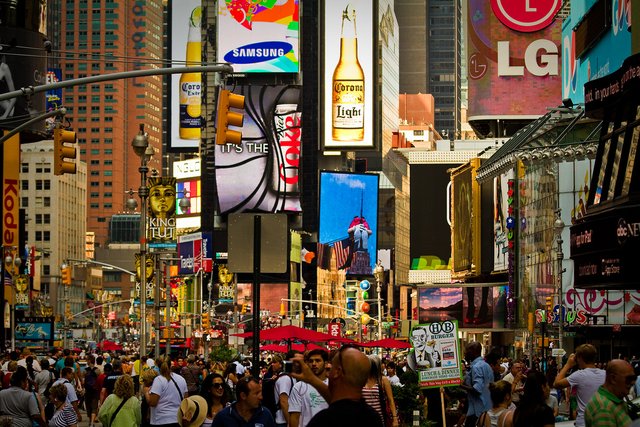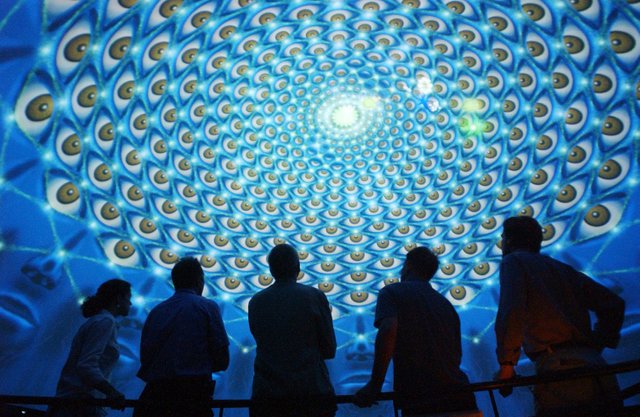THE UNCERTAINTY OF THE PRESENT - CHAPTER II - THE NEED TO BE VALUED

| Source |
One of the current characteristic emotions is anxiety and shortness of time. Precisely because of a series of phenomena that have occurred, such as globalization itself, the intervention of the media, that is to say, haste, filling the life of things, being aware of so many things, being aware of so many possibilities, makes us fill us with tasks and make everything much more accelerated because simply time does not give us to do what we want to do.
In other times, there was a more limited awareness of life, we could not do so many things, we did one or two things. In those slowness there were other ways of knowing and communicating as human beings. You and I could sit one afternoon on the porch of the house, have a few beers for four hours and meet and you would know who I was and I would know who you were. Nowadays, those times have been taken away from human beings, and those possibilities of human contact have been abbreviated every day.
It continues, however, the human need to know the other and to make ourselves known, to want to show us how we are, to make contact with the other, an affective contact and that somehow you recognize me or appreciate me, in short: need to be valued. But since you and I do not have time to sit down and talk, then I go to a symbolic universe of objects, with which I will briefly tell you who I am.
Nowadays, the great struggle in brands is precisely to be able to treat an experience, it is not to give an object, it is not to give a product. It is no longer about selling products but about selling a human experience and that human experience will attract.
That has a lot to do with brevity, with the acceleration of subjective time because with the superficiality of contemporary times, where there is no way to go to the depths, there is no way to penetrate further, to go to something more dense , we need multitudes of instant messages and those messages can be given subliminally through the objects with which we surround ourselves. Now the way we appear, is our existential proposition and accounts for our essence apparently immediately.

| Source |
A kind of signal system to which we have gone before the impossibility of giving signs in a much slower and transparent way and saying who we are, in a world of deeper and more structured relationships.
The confessional argument of who we are, with our doubts, our problems, our small greatnesses, our mistakes and triumphs, has been codified in the appearance in which we show ourselves before the world *** we are this ***, even so it will continue Underlying the individual with all its complexity, is it not true?
It is a veil of appearances, which is one of the tremendous traps of contemporaneity and time. The process of socialization of human beings, until at least the mid-twentieth century gave importance to people, father, mother, grandmother, etc. Today, father figures have far less weight in the psychological formation of individuals than objects of consumption or spaces.

| Source |

| Source |
Before there was a process of socialization that was among many, in the family dinner where people stayed talking and through there passed the messages, traditions and family and cultural identities. Today there is a displacement of that tradition, because the person no longer eats as a family, no longer has that referential, and grandma is not as important, being much more important symbolic referentials in shopping centers.
At the moment there are elements of the environment, of the spaces of the city, of the buildings, of the things, that are having much more weight in the construction of the identity of the adolescents than the people. People have ceased to be important and the personification of things has been privileged. Things begin to have qualities of people and begin to have much more influence on the determination of the psyche.
I think that is a well-generalized contemporary quality. However, instead of being elements that enter into the construction of the personality in a prolonged and slow way, they are like intermittent presences. An existential zapping as instants of brevity that have an impact and shape the personality.
of the events that occur worldwide.
Usually, we try to construct ourselves trying to see ourselves as they see us from the outside, but those looks are brief glances, momentary glances, where intimacy has another dimension to what man could have at the end of the 19th century or early of the twentieth century. It's another concept of individuality, another concept of identity, I do not know if for good or for bad, but different. We see it, for example, with the idea of fame.
Today perhaps that becomes one of the main passions of the human being, the idea of being, of being present in the mind of the other, through social networks and the media.
The important thing of the celebrity today, unlike Renaissance fame or heroic fame, is that before the fame was due to the facts or at least backed in them, not today. Nowadays what is the sense of celebrity? To be celebrated, celebrated for what? Does not matter. So these are changes, nuances but they also have to do with brevity, with the possibility of seeing you through an external eye, in order to build your own identity.
when he said in the 60's that about the whole world
he was going to play his fifteen minutes of fame.
Throughout the history of culture, in all this process of individualization of the person, that process of development that is sometimes so difficult, to move from one mental dimension to another, you need symbols, and those symbols were given through people or through traditions.
In primitive societies there were rites of transition, which were symbolic processes that helped you to move to the next stage of life, overcome certain moments and build a new identity. For a very long time, this whole process has been based on people, on individuals: the father, the mother, the family; and in institutions: the school, the city, have been a bit like the guide in that process of individuation.
Insofar as human beings' time has been accelerating, precisely because of the same conditions of the transformation of the world in the media, there has been less chance that these figures have an influence on the processes of socialization. The stages are still difficult, and they are still necessary.
Then, in the absence of significant human figures, for the same complications of life, before that human void the objects act as symbolic intermediations and serve, many times, as those messages that are no longer received from human beings, but rather through the great messages built.
Before was to be equal to our neighbor, now no, today we seek to differentiate, through a pattern of identity or equalization, with an idealized figure that is that star figure that is there in the media that, in general, has a lot more great consumption possibilities.
And then, when you identify with him or her, you subsume in a pattern of anxiety and exigency and stress with yourself, and then you get indebted until the priceless, to *** be able to be ***, identifying you with ideal patterns, molded by culture, which can have extremely pernicious issues.

| Source |
Through social networks it is much easier to create an image, what I see of the world of the internet and that is particularly interesting, is that not only does it lend itself to presenting an image of you with which you idealize or would make of yourself the be social that you would like to be, making you be appreciated by others, in the way you feel that others expect, but also gives the opportunity to live many facets of your personality that habitually live in shadows.
Idealized and somber. There are people who have Internet relationships that are totally dark and disconnected from their real life, from their daily life; we can see it a lot in the sexual aspect. Remember that the life of human beings goes largely in fantasy. People live more in the imagination than they do in real and literal sexual acts. What happens is that another dimension has formed and connects with that empire of objects; because the person spends much of the day or most of the day in front of a computer and that computer is the means of relationship.
It seems that this technology has created an intermediate space that makes possible a type of sociability mediated by the instrument. Then, there is something there of the magic of the object, of the magic of the instrument, of the article of consumption that allows that facets of the personality leave that otherwise are inhibited. And the same happens on the internet.
When you are meeting with a person, there are a number of components of mimicry, of your physique, of expressions, etc., which are projecting very direct messages that can be very strong for many people. Then, the moment the person achieves the distancing is when he can socialize. The socialization and approval of the other is one of the most powerful motivations of the human being, coupled with the need to create self-esteem through recognition.

| Source |
It is a fictional world but it gives a space to certain people who need to get those things from the world, where they can act, since they have a hard time acting in the real world. In turn, the virtual world gives the possibility of existence to the multiple selves that we carry inside, to the multiple personalities that we are, and that is interesting, but also delicate.
This is how, covering a fairly broad hyperbole that started with consumption, I want to close by saying that the issue is: to what extent do people identify themselves or not with that role within an economy; up to what moment are we economic actors and at what moment we cease to be.
I believe that there is the great challenge of the 21st century, that the market economy can continue to work and in that sense labor is one of the goods that enter the system, but from the point of view of personal identifications and relationships between people are not determined by the value of the merchandise. That is, there may be a flexibility in which the individual leaves and enters different roles, in that sense.
After all, the main human motive is to be seen and recognized by the other and to feel their own value from the look of the other. Then its presence as a commodity, whether or not it is valued monetarily, would end up being its own measure. That seems horrible to me.
I believe that the process of creating individuality, the process of individuation of the human being and of the human species in general, is what will allow us to break away from those global visions that can see the individual in its different facets and what is important is have the flexibility not to identify with only one facet of our personality, but to see it in its proper sense of the function it has for certain achievements and not for others.
I believe that only the development of individuality *** which is one of the great struggles of contemporary times *** gives us that possibility and is what opens us the possibility of a new order, always dynamic and adaptive to reality changing
In this age that they call of information, the bad man who is well conforming a picture of knowledge that even gives him account of himself, of the contemporaneity in which he is inserted and therefore of a greater margin of conscience, self-consciousness , social conscience, and even universalist consciousness.
So yes, I trust that better times await us ...

| Source |
"Your look will become clear only when you can see inside your heart.
He who looks out, dreams; he who looks inward, awakens. "
Carl Jung
I Am the One I Am - I Am My Master
Instagram | Facebook | Linkedin
Saturday, May 12, 2018
Alberto J. Tang H.
Congratulations @albertotang! You have completed some achievement on Steemit and have been rewarded with new badge(s) :
Click on any badge to view your own Board of Honor on SteemitBoard.
To support your work, I also upvoted your post!
For more information about SteemitBoard, click here
If you no longer want to receive notifications, reply to this comment with the word
STOP